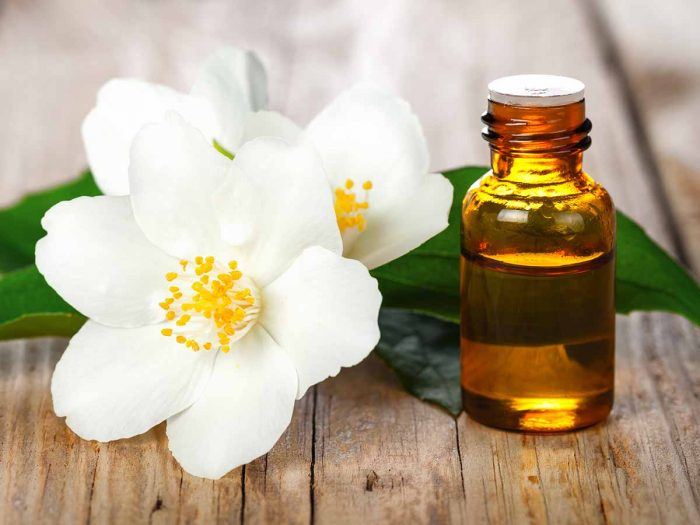
The health benefits of jasmine essential oil can be attributed to its properties as a potential antidepressant, antiseptic, aphrodisiac, antispasmodic, cicatrizant, expectorant, galactagogue, emmenagogue, parturient, sedative, and a uterine substance.
What is Jasmine Essential Oil?
Jasmine essential oil is extracted from the flowers of jasmine, and it has various scientific names including Jasminum grandiflorum (Royal jasmine) and Jasminum officinale (Common jasmine). The oil is extracted mainly from the latter variety. Its main components are benzoic acid, benzaldehyde, benzyl acetate, benzyl alcohol, indole, benzyl benzoate, cis-3-hexenyl benzoate, cis-jasmone, ceosol, eugenol, farnesol, geraniol, linalool, methyl anthranilate, p-cresol, nerol, gamma terpineol, nerolidol, isophytol, and phytol. Jasmine is a very famous flower. It has a strong yet sweet, pleasing, and romantic fragrance, which is very common in flowers that bloom only at night. The jasmine flower is often associated with romance and love. Heroes in romantic novels and movies can often be found addressing their heroines by the name “Jasmine”. For ages, jasmine has been inspiring poets as well. This flower blooms only at night and fills the surroundings with its unmistakable and alluring fragrance. [1]
Health Benefits of Jasmine Essential Oil
This flower has much more to offer than its sweet smell and romantic associations. For the moment, let us put our poetic feelings aside and explore some of the impressive health benefits that jasmine can provide us with.
May Relieve Depression
Collaborative research by the Department of Botany, Bose Institute, Kolkata, India, and the Department of Molecular Cardiology Cleveland Clinic, Cleveland, USA, suggests that jasmine oil has an appealing fragrance. This aroma of jasmine essential oil has a pleasing and uplifting effect on the mind and it might actively fight depression. This makes a person feel happy and potentially awakens romantic and poetic feelings, just as it has done in literary and musical history! The aromatic effect of jasmine oil stimulates the release of certain hormones in the body, including serotonin, which results in the boost of energy and the uplifted mood. [2] [3]
May Prevent Infections
Jasmine flowers are known to have antiviral properties, as per a recent study published in the Journal of Ethnopharmacology. Jasmine essential oil is also a very good antiseptic and disinfectant. Its constituents like benzaldehyde, benzoic acid, and benzyl benzoate may have potentially germicidal, bactericidal, fungicidal, antimicrobial, and antiviral properties. When externally applied to wounds, it may prevents them from becoming septic and effectively eliminates potential infections from tetanus. It can also have internal applications, and when inhaled, it is known to reduce infections in the respiratory system and can relieve colds and coughs. [4][5]
How to use Jasmine Essential Oil
There are many simple ways to use jasmine oil. Find them below.
- If you are feeling tired and exhausted, you can use jasmine essential oil in a diffuser to uplift your spirits.
- Inhale the aroma of jasmine oil for a relaxing effect.
- You can 2-3 drops of the oil to a warm bath.
- Mix 3 drops of jasmine oil with an ounce of carrier oil like coconut oil and use it for a massage.
Word of Caution: Pregnant women should avoid using this oil until parturition since it is an emmenagogue. It is highly relaxing and sedating and thus heavy doses should be avoided. Again, those who are allergic to jasmine should avoid using it, as with any essential oil made from a known allergen. Blending: Essential oil of jasmine blends well with the essential oils of bergamot, sandalwood, rose, and citrus fruits such as oranges, lemons, limes, and grapefruits.
